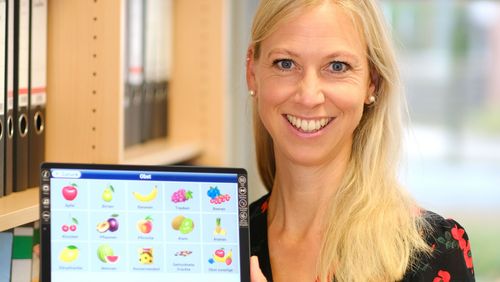When the number of people infected with the corona virus rose dramatically in spring, many people did not seek medical care. Here, health care researcher Lena Ansmann explains the reasons for this – and how health literacy can help to ensure that everyone is well cared for.
Prof. Dr. Ansmann, you are involved in the competence network Public Health Covid-19. What is the work about?
Various professional societies jointly founded the network at the beginning of the pandemic. Our aim is to summarise and evaluate the current state of knowledge on specific issues concerning the public and health policies during the pandemic and also to make recommendations. Ultimately, we want to help those responsible to make evidence-based decisions.
You have specifically dealt with health literacy of people who are not affected by Covid-19. Why?
Early on in the pandemic it became clear that many people were using medical care less often than usual. This is partly because access to hospitals and other health care facilities was limited, and in some cases still is. But even in places where access was mostly open, such as doctors' surgeries, people did without health care and cancelled preventive appointments. We wanted to find out why this is the case – and bring the issue to the forefront.
How did you approach the issue?
We looked at studies done in the early stages of the pandemic or during other pandemics, such as SARS. To do this, we searched in literature databases and examined statements by medical societies. We also analysed articles in the Deutsches Ärzteblatt, the most important medical journal in Germany. Unfortunately, we found that there are only a few good studies. But they all point out that one of the main reasons for not going to a doctor is, of course, the fear of getting infected. Some people do not take advantage of care to reduce the burden on the health care system. Visiting bans have also prevented some people from going to hospital for a planned procedure. People prefer to go to hospital another time if they fear the prospect of being isolated in one ward.
So how problematic is it when patients deliberately choose not to receive health care?
Some visits to doctors or hospital stays can certainly be postponed or are even unnecessary. But it is critical when acutely ill people no longer go to emergency departments. For example, there were fewer diagnoses of heart attacks in the spring. This didn’t occurr less frequently, but instead they went unnoticed. Chronically ill people or people who have cancer also have to weigh up the risk of infection against the question of whether they absolutely have to continue their treatment. The question is: How do I protect myself as a vulnerable person? These are not easy decisions. In order for people to weigh them up, they need information that is easy to understand. That is what we call "health literacy": How easily do patients find and understand information and use it to make good decisions?
What ideas are there to promote these skills?
In the past, it was often about strengthening the competence of individuals. One idea, for example, is to teach health literacy already at school. In a pandemic situation, however, this does not work quickly. Rather, the environment must be geared to the needs of those seeking advice and, for example, find appropriate ways to provide information in an understandable way. First of all, however, we have looked at what measures have actually been taken at the organisational level to deal with the pandemic situation.
What were the most important measures?
To ensure the safety of patients, organisations such as hospitals have separated wards with Covid-19 patients and the staff who care for them. This was quickly implemented. But these organisational changes also need to be communicated: Because being aware of these changes will create trust and people are thus more willing to take up care. Good communication should also clearly state that many measures are only temporary. This also helps people to make decisions about how long they will postpone therapy, for example.
How have other care institutions, such as family doctors' surgeries, reacted?
In fact, doctors have increasingly offered video and telephone consultations instead of personal contacts. This has long been recommended and has now finally been implemented. Good online consultation hours have long been a topic of healthcare research, for example for rheumatism patients who need individual care. Practices were also called upon to organise their schedules differently than usual, with less waiting and more realistic buffer times. The idea behind this, of course, is that patients have less contact with each other, which reduces the risk of infection. But again, these measures only work if those affected are aware of them. Patients should be able to find this information on the doctor's website, for example. They should also be aware of general obligations, such as adhering to basic hygiene measures. This creates trust and allows patients to take advantage of the necessary care.
How can the various players in the health care system improve their communication?
We recommend, for example, that hospitals offer telephone counselling. Patients could call a doctor, for example an oncologist, for advice on whether or not they should come to the hospital for their appointment. Looking at the websites of hospitals in Oldenburg, Magdeburg and Freiburg we could identify only very few such services. Among other things, it is difficult to keep qualified staff available. We also need to find new ways of providing information to the general population at the level of the health system. This is not just about communicating general aspects such as hygiene measures in the pandemic. The health system must also reach out to people who have other concerns, providing information and advice, and providing contact persons.
Are there already good examples of this?
The cancer information service in Heidelberg has been practising this for a long time. But there are only a few offers for general care. There are also nationwide patient portals and in September a new national health portal started. But who in fact is familiar with these services? And who do they reach? The Federal Centre for Health Education has many years of experience with major campaigns - especially through the mass media. But even that is not enough in the event of a pandemic. We also know from previous research that health literacy and social class are related. Information must therefore be prepared in multimedia form to reach the various target groups. There are also good local approaches, for example the so-called health kiosk. There, people seeking advice receive low-threshold information from health professionals. This is a great project for people whom we otherwise have difficulty reaching.
What would have to happen now to ensure that people get the health care they need despite the pandemic?
The quickest way to implement this is for health care facilities – that is hospitals or doctors' surgeries – to provide information via their websites. If, for example, information is provided about the fact that the staff of a clinic are regularly tested, this will create trust among the population. The best measure, however, would be to contain the infections as much as possible. Then no dilemma arises. We wouldn't have to restrict the health care and the population would be reassured. That would happen all by itself.
Interview: Constanze Böttcher



![[Translate to English:] [Translate to English:]](/fileadmin/_processed/5/d/csm_iStock-1223445550_0286020fe8.jpg)
![[Translate to English:] Prof. Dr. Lena Ansmann](/fileadmin/_processed/2/2/csm_5D4L0432_cb6bca9822.jpg)


